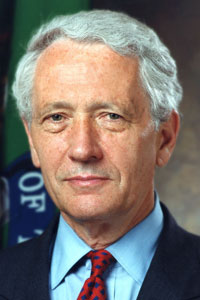Kenneth Dam appointed to IMF reform committee
By Sarah Galersgaler@uchicago.edu
News Office
 Kenneth Dam |
|
Law Professor Kenneth Dam will serve on an International Monetary Fund governance-reform committee, which will “assess the adequacy of the fund’s current framework for decision-making and advise on any modifications that might enable the institution to fulfill its global mandate more effectively,” according to an IMF news release announcing the committee.
IMF Managing Director Dominque Strauss-Kahn appointed Dam, the Max Pam Professor Emeritus of American & Foreign Law and Senior Lecturer in the Law School. “I am more than pleased to be included,” Dam said. “I spent the better part of a decade of my academic life doing research and writing on the origins and role of the IMF, research that culminated in my 1981 book, The Rules of the Game: Reform and Evolution in the International Monetary System.”
The IMF is an international organization that was created in 1944 to stabilize exchange rates and promote international cooperation on monetary issues. Its effectiveness has been questioned due to the rapidly changing global financial system, while its burgeoning membership, up to 185 countries from the original 44, has led to complaints about its governing structure.
“In the present world financial crisis,” Dam said, “the IMF is not part of either the solution or the problem, but is simply absent from the tables where solutions are being sought. One of the reasons is thought to be an outmoded governance structure. Hence, the Managing Director of the IMF appointed this committee.”
According to Dam, though, the governance concerns are not new. “[They] date back to a conflict in 1944 between the British plan advocated by John Maynard Keynes and the American plan promoted by Harry Dexter White. The American plan won the day, but the way things worked out has led to the present IMF staff proposal of a reform that reflects the views of Keynes. So I enjoy reliving history.”
The committee’s mission is part of a larger effort to restructure the IMF’s institutional framework to restore its legitimacy. Strauss-Kahn hopes to have the committee’s proposals by this coming April to integrate into a comprehensive action plan by September 2009.
Dam’s scholarly work has focused on law and economics, particularly with respect to international issues. He also has served the federal government as deputy secretary in the Department of Treasury from 2001 to 2003, and in the State Department from 1982 to 1985.
The IMF committee’s assignment fits well with Dam’s current research. “I am now writing on the present world financial crisis. So the work of this committee gives me an entirely new view of possible solutions—namely, the possibility of the IMF playing an intermediary role among the various national governmental views on what to do.” Dam added, “I hope we can help the IMF improve its governance structure so it can become a more useful and relevant organization.”
Trevor Manuel, Minister of Finance of South Africa, will chair a committee of eight distinguished individuals, including Michel Camdessus, former Managing Director of the IMF; Mohamed El-Erian, co-CEO and co-CIO of Pacific Investment Management Co.; Sri Mulyani Indrawati, Minister of Finance of Indonesia; Guillermo Ortíz, Governor of the Bank of Mexico; Robert Rubin, Senior Counselor at Citigroup; and Amartya Sen, professor at Harvard University.
![[Chronicle]](/images/sidebar_header_oct06.gif)